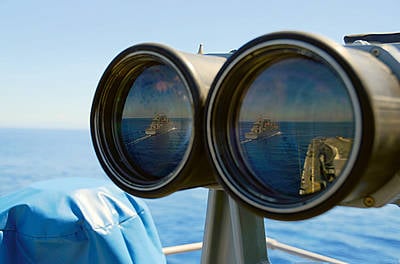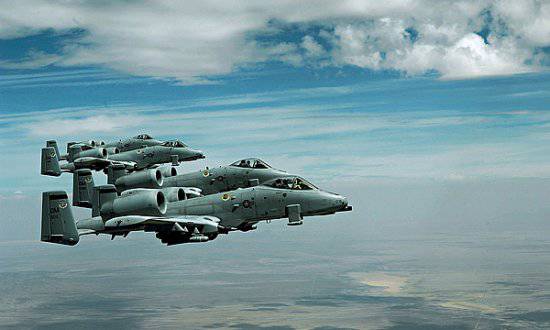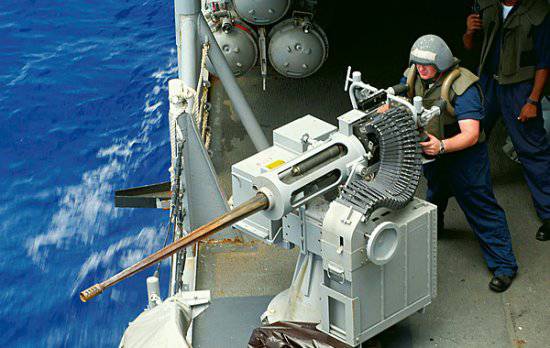Wars for water

GLOBAL PROBLEM
Almost two thirds of the human body consists of water, so every day he should drink it about 2 liters. And although more than 70% of the earth’s surface is covered with water, only 2,5% is suitable for drinking. In addition, fresh water is distributed very unevenly. If somewhere its abundance is taken for granted, then in a number of regions the situation is different: at the end of 2006, 80 countries in which 40% of the world's population live have said they are experiencing water shortages. For every inhabitant of the Earth, on average, there are 7,5 thousand cubic meters of water, but they are distributed very unevenly: in Europe - 4,7, and in Asia - only 3,4. Water consumption - per person - varies significantly even in developed countries, between Europe and the United States - at times. The UN estimates the shortage of fresh water in 230 billion cubic meters per year, by 2025, it will increase to 1,3-2,0 trillion. According to other calculations, a quarter of a century already two thirds of earthlings will experience water shortages.
It cannot be said that the world community does not react to the current situation. Thus, the UN Water Secretariat was established in 1978, and 2003 was declared the International Year of Freshwater, the period from 2005 to 2015. proclaimed the "Water Decade". During the "International Decade of Drinking Water and Sanitation" in the 80-ies of XX century. managed to increase the supply of drinking water to the population of cities by 2%. This time the number of people living in conditions of water shortage is planned to be halved.
However, the situation on the planet is deteriorating. Every year about 6 million hectares of land turn into a desert. Due to poor hygienic conditions caused by a shortage of water, about 6 thousand people die every day in the world. Over more than 20% of the land area, anthropogenic activity has gone beyond the limits of the capacity of natural ecosystems, which are beginning to serve only to meet human needs and no longer possess the properties of natural objects.
Water quality is also deteriorating. Every year, 160 billion cubic meters are taken from groundwater by man, and up to 95% of liquid industrial waste is discharged into water bodies absolutely uncontrollably. Acid rain in many countries is no longer a rarity. If pollution becomes irreversible, then water can go into the category of non-reproducible resources.
Under these conditions, the establishment of control over water reserves is increasingly becoming the cause of international conflicts, especially if neighbors have historically been hostile and one country is able to restrict water flow. Groups of extremist and criminal persuasion come to grips with water, especially where the power is corrupt or there are signs of anomie of the state.
Despite the fact that the conflict potential is obvious, the whole range of problems in the field of national and international security, one way or another related to water, is much wider, and therefore should be considered as a whole.
According to many reputable experts and analysts of the war over water can become a reality of the XXI century.
HYDRAULICS
The role of water is most obvious - both as a means of maintaining vitality and as a means of destruction - manifested in military conflicts. Alphabetical truth: depriving the enemy of water supply guarantees victory over him. To do this, arrange dams and block the river, fall asleep and poison wells, etc. In the desert terrain water sources are in the focus of the struggle. Such an episode of World War II was vividly described by front-line writer Vladimir Bogomolov: “He remembered the battles two years ago — in the summer of forty-second, in the Kotelnikovo region, near Stalingrad. His company - nineteen people! - defended the well. Ordinary well. There, in the steppe, wells are rare, and there was a fierce, deadly struggle for water sources. ” It is not surprising that even nowadays, with the deterioration of relations with South Ossetia, Georgia immediately restricted the flow of water to Tskhinval.
For obvious reasons, hydraulic structures can be captured or purposefully destroyed. As is known, in 1945, in order to prevent the advance of Soviet troops in Berlin through the metro, Hitler ordered to flood it with the Spree. The US and British troops, conducting an operation in Iraq at 2003, feared that Hussein would use "hydraulics" (water release from reservoirs). Nowadays, units of the army of Uzbekistan gain experience in conducting exercises at hydrotechnical facilities.
Organizing the fight against terrorism, developed and therefore vulnerable societies have to reckon with the likelihood of destruction of hydraulic structures, which has disastrous consequences. For the very same terrorist structures, the defeat of such objects provides the necessary opportunities for asymmetric confrontation. A few decades ago, a German sociologist and lawyer, Carl Schmitt, described the possible scenario in the following way: “I can imagine that here in Sauerland ... a genuine partisan in children's doctor’s overalls will go to the nearest mountain and from there destroy all the dams blocking the floodplains of the Sauerland and the nearest area, “The effect will be that the whole Ruhr area will turn into a swamp.” It should also be recalled how in November 2006 the domestic special services prevented the extremists' intentions to carry out a series of explosions at the hydraulic structures of southern Russia. “If a sabotage and terrorist action is carried out on one of them, catastrophic consequences may arise, including paralysis of the vital activity of the whole region, large human casualties, serious economic losses,” Nikolai Patrushev, who headed the Russian FSB, then admitted.
Military force remains the main way to resolve both political and economic contradictions.
WATER RESOURCES AS A POLICY TOOL
Practice shows that water can also be a powerful tool for the realization of national interests. A very typical example of the pragmatic and rational use of its hydro resources and natural geographical position is Turkey. The country has experience in selling significant amounts of drinking water, but what is of interest is not so much the commercial side of the problem, as Ankara’s flexible use of “water” leverage on its neighbors.
Maximum benefits are derived from the fact that the upper reaches of the Tigris and Euphrates, where 22 dams, 19 hydropower stations and reservoirs are planned to be erected, are located in Turkish territory. Due to the small amount of precipitation, countries in the basin of these rivers are forced to resort to artificial irrigation of agricultural land. If the plans outlined by Turkey are implemented, the volume of water going downstream to downstream Syria and Iraq will be significantly reduced. Turkey, on the other hand, gets the opportunity to allocate water to its neighbors in a measured way, the volume of which directly depends on their “behavior” and compliance. By the way, in 1990-1991, on the eve of the Gulf War, Turkey - by agreement with Syria - has already resorted to exerting pressure on the Hussein regime by limiting the water supplied.
Water as a pressure tool is used by Turkey and in relation to Syria itself. In 1987, two states signed an agreement regulating water issues. Ankara's condition was the requirement for Damascus to abandon the support of the Kurdish Workers Party. It is characteristic that hydraulic structures are created by Turkey just on the territory of the Kurds, who are fighting for the creation of their own state.
STRUGGLE FOR WATER ALREADY BEGAN
Apparently, the very first wars in stories humanity was due to a shortage of life-giving moisture: another two and a half thousand years before Christ in Mesopotamia fought hard for the right to use the waters of the Tigris and Euphrates. In modern conditions, the likelihood of war itself for water as a vital resource sharply increases.
 Thirst in the world affects millions of people.
Thirst in the world affects millions of people.The situation is such that about 50% of land is supplied with water from river basins owned by two or more states. Neighbors sometimes readily accuse each other of creating a deficit or demonstrate readiness for the use of military force. So, at the end of 70's. the last century, Egypt threatened Ethiopia by bombarding dams built in the Upper Nile, which were built with the support of the United States.
At present, many reputable experts and politicians agree that after the era of the fight against terrorism, armed conflicts over resources will follow in the coming decades, and water will become one of the main targets of the confrontation. At the same time, representatives of the expert community and politicians in the West express the most active concern, while the competent position of the Russian side on this issue has not yet been voiced.
Back in 1995, Vice-President of the International Bank for Reconstruction and Development I. Serageldin expressed confidence that the wars of the next century will be fought not for oil, but for water. Former Minister of Defense of Great Britain D. Reid predicted the onset of the era of "water wars". At the summit on climate change in 2006, he warned that political conflicts would increase as the water basins turn into deserts, glaciers melt, and water poisoning. The depletion of water sources is becoming a threat to global security, and the British army must be ready to participate in resolving emerging conflicts. Raid is not alone in such predictions. In fact, at the same time, M. Allo-Marie, who served as the head of the defense department of France, said: "Tomorrow's wars are wars for water, energy, and perhaps for food." Her words deserve special attention against the backdrop of the food crisis on the planet. The rector of the UN University G. van Ginkel also pointed out that “international and civil wars over water threaten to become the main element of the political life of the 21st century”.
In research institutions, the United States tends to link the problems of water, on which stability in many oil-exporting countries depends, on energy security, and, traditionally, on the possibility of promoting American values in the world. In a report by the Center for Marine Research, sent to US President 2007 in April, it was noted that the reduction of water resources poses a “serious threat” to national security. A group of retired admirals and generals warned that in the future the United States would be dragged into violent wars over water. Expert structures close to the Washington administration are no less categorical in the conclusions: “The water issue is critical for US national security and is an integral component in supporting American values in humanitarian and democratic development.”
Without waiting for the inevitable exacerbation of the situation on a global scale, Washington is preparing to single-handedly dispose of nearby bodies of water that have so far been shared with neighbors. In 2006, the US government announced its intention to use the Great Lakes Coast Guard, which are polluted at an alarming rate, and the water level is steadily falling due to the huge population and industry growth around them, patrols on ships armed with machine guns. For training along the shores, 34 shooting ranges were created, numerous exercises were held, in each of which thousands of live ammunition were fired towards the lakes.
The United States embarked on an enhanced option to patrol the Great Lakes.
POTENTIAL OF CONFLICT NEAR RUSSIA
It should be noted that the potential for conflict is growing in the immediate vicinity of Russia. In Central Asia, friction over water resources occurred during the Soviet era, but then we lived in a single state, and the situation could be contained. Today, the situation is rapidly deteriorating: it is expected that in 15-20 years the water resources of the region will be reduced by at least a third.
First, climate change is acute in the region. In the Fergana Valley for a number of years, drought has been standing, the waters of the Syr Darya do not reach the Aral Sea, barely reaching the middle of the territory of Uzbekistan. The western regions of this country are almost completely dehydrated.
Secondly, the anthropogenic load on the ecosystem is increasing. The region has a high population growth rate, and food shortages make it impossible to reduce the area under crops. Watering them is still done in an archaic way, according to aryks, as a result, moisture is spent several times more on growing crops than when applying modern technologies. The sad results of what is happening can be seen on the example of the Aral Sea, whose area has been reduced many times over half a century due to the “cold war” of the countries of the region behind the waters of the Amudarya and Syrdarya. But recently the affluent and rich in fish sea was the fourth largest lake in the world.
Thirdly, interstate relations regarding the use of water resources are not regulated. The most acute contradictions arise about the operating mode of the Toktogul reservoir, located in Kyrgyzstan and containing approximately 40% of all freshwater resources in the region. The republic itself suffices a tenth of the total annual runoff, however, for several years now, due to lack of funds, it has to be heated by electricity generated at its own hydroelectric power plants. As a result, in winter more water is discharged than is required by Uzbekistan and Kazakhstan, but in summer, when the need for water is much higher, the discharge is limited.
Kyrgyzstan, Kazakhstan, Uzbekistan and Tajikistan have concluded a framework agreement on the use of hydro resources of Naryn-Syrdarya Basin rivers, providing for the annual signing of quadrilateral documents with the subsequent signing of bilateral agreements. However, for a number of years Tashkent has been avoiding signing. Meanwhile, the Uzbek army has already conducted military exercises on hydraulic structures.
The leaders of the countries of the region in forums of various levels (within the framework of the SCO, CSTO, CIS) exchange reproaches and appeal to Russia. N. Nazarbayev expressed a number of claims to China. Astana has serious concerns about a number of “water” projects in Beijing. The President of Kazakhstan can be understood if one considers that his country occupies the last place in the CIS in terms of water availability.
The leadership of the People's Republic of China aimed at accelerated development of Western China, where the construction of the canal is being completed, along which part of the water from the headwaters of the Irtysh will be transferred to the enterprises of the Karamaya oil basin and for irrigation of farmland. It is also planned to increase the water intake in the upper reaches of the transboundary Ili River, which provides 80% of the water inflow into Lake Balkhash. Increase the volume of water intake from Or in China with 3,5 cube. km per year to 5 will cause shallowing and salinization of Balkhash. The Irtysh is the largest tributary of the Ob, one of the main rivers of Russia, and feeds Lake Zaisan in Kazakhstan. Implementation of Beijing’s plans will significantly reduce the flow of water to a number of regions of Kazakhstan, the cities of Ust-Kamenogorsk, Semipalatinsk, Pavlodar, the Irtysh – Karaganda canal will be threatened by water hunger, and the level of the Irtysh in the Russian Omsk region may fall by 60, see.
In China itself, the shortage of quality water is felt almost everywhere, 70% can not be used even for technical purposes. River pollution with the most hazardous wastes has become commonplace, and there are practically no wastewater treatment plants at the plants. Beijing usually conceals the scale of accidents and disasters, which makes it difficult to assess their consequences and take appropriate measures by neighbors. Dust storms, yellow rains come to Russia from China. Along the border Sungari there are hundreds of industrial enterprises that do not have environmentally friendly facilities. To eliminate the effects of pollution, Russia has already used military units.
It will not be difficult to estimate what interest in the conditions of the ever-growing resource hunger is experiencing a booming China to its northern neighbor, especially considering that in the vast area from Baikal to the Pacific Ocean, so rich in natural resources, only about 10 million live in Russia. person. Obviously, such an imbalance cannot persist indefinitely in and of itself.
Under these conditions, it is alarming that China officially adheres to the doctrine of increasing its “living space”. They believe that the peculiarity of the development of the modern world is the desire of most countries to establish new strategic borders for their living spaces, adequate to their real power. Therefore, they believe in Beijing, the strategic boundaries of the living space of the "strong" powers go far beyond the borders of the state, and the real sphere of influence of the "weak" states does not match their capabilities, which may lead to the loss of control over the territories. In accordance with such installations, the state border is considered to be unshakable and not subject to revision, while the strategic border extends far beyond the actual territory of modern PRC. The space outside the country in Beijing is considered necessary and possible to explore, avoiding a formal violation of borders. Within strategic boundaries, the use of military force to protect one’s interests is allowed. At the same time, the PRC leadership demands that the military strategy be put at the service of the economic and political interests of the state, taking into account the country's development forecast before 2050.
And here the question is legitimate: will China consider Russia as a “weak” state?
People’s Liberation Army of China (PLA)
CLAIMS ON WATER RESOURCES OF RUSSIA
Approaches to solving the problem of fresh water shortage on a global scale, affecting Russia, are forming in the world. Thus, M. Barlow, the author of the Blue Covenant book, identifies three main causes of the water crisis: depleting freshwater sources, unfair access to water sources, and corporate control over water reserves. All this, according to the author, is "the main modern threat to the planet and our survival." Therefore, it is proposed to start with a global treaty - a “covenant”, which should include three obligations. The first is water conservation, which requires people and states to protect and preserve the world's water resources. The second, about water justice, is between the world North, which has water and resources, and the world South, which is deprived of it. The third obligation, on water democracy, is between all governments that must recognize that the right to water is the fundamental universal right of the people. Including governments must recognize that citizens of other countries also have the right to water.
The fact that Barlow proposes to unconditionally provide abstract “all” unhindered access to the water of any state, to put it mildly, is embarrassing. After all, the answer to the question of who has enough water, and who needs it so much, is not an open secret; compensation for the owners of the water is not envisaged.
Most likely, in the conditions of aggravated global struggle for resources, such an approach will find interested supporters. As is known, the world public opinion is persistently and professionally imposed on the idea that Russia's natural resources are the property of all mankind. To be more precise, they should be freely used by those who need them. By the way, in the spring of 2006, the former US Secretary of State M. Albright declared the injustice of the situation when Russia has so much natural wealth that she does not know how to dispose of. In a word, if we reject the excessive casuistry and call things by their own names, then countries rich in fresh water, among which Russia is first of all, are invited to “share” in an amicable way.
To assess the prospects for Russia, it should be borne in mind that the position of our country is unique. Suffice it to say that 23,6 thousand cubic meters. km of Baikal water is not only more than 80% of Russian fresh water reserves, but also more than 20% - of the world. In general, our country has the third world reserves and is in second place on this indicator, second only to Brazil. However, Russia is distinguished by a more favorable geographical location and proximity to countries experiencing water shortages.
It is difficult to say what the original intent was the organizers of the 5-th World Water Forum, held in Istanbul on 2009 in March, but its topic (“Elimination of boundaries separating water”), in view of the above, sounds quite ambiguous. It seems that the era of universal love, prosperity, equal opportunities, complete pacification and accession of humanism will not come soon. The realities are such that pragmatism still prevails in international relations and political actors defend national interests (usually at the expense of others), while the shortage of natural resources is intensifying with all the ensuing consequences.
In any case, Russia is rapidly approaching the point where it is necessary to make a choice. I wish he was not spontaneous, but conscious and prepared, with calculated consequences and scenarios.
WHAT TO DO?
For a start, you should restore order in the country. Indeed, in Russia there are still quite a few cities and towns where water is supplied for several hours a day. The government pays special attention to the low quality of water, which has led to frequent cases of mass poisoning and outbreaks of infectious diseases. Without high-quality drinking water, it is not necessary to talk about improving the demographic situation, health and life expectancy of Russians. The country ranks seventh in the world ranking of water purity, which is more likely due to its huge total reserves. The dirtiest regions are the Urals, Western Siberia, and Amur. At a meeting of the Security Council of Russia 30 December 2007, the then head of state stated that in some regions from 35 to 60% of drinking water does not meet sanitary standards. V. Putin noted then that the “transboundary pollution of the territory ... in the Amur and Irtysh river basins” had intensified, in fact, directly pointing to China. D. Medvedev in his speech said that about 40% of surface and 17% of underground sources of drinking water in the country do not meet sanitary standards. The meeting identified a number of measures to improve the situation.
Significant results have been achieved in water saving. Thus, the average Muscovite today consumes 280 liters per day, a few years ago it consumed more liters per 100. As the Minister of Natural Resources and Environment of Russia Y. Trutnev 20 reported in March on 2009 in Istanbul, over the past 5 years, the country has managed to almost halve the use of water per unit of gross domestic product.
 Clean drinking water becomes an invaluable resource in a world choking on pollution and hazardous waste.
Clean drinking water becomes an invaluable resource in a world choking on pollution and hazardous waste.Obviously, there is a need for a comprehensive, holistic, conceptually shaped water policy (hydropolitics) of Russia, which would tie together both internal and external aspects. The objectives of such a policy should be to determine: respect for and protection of available resources; discovery of new water resources; rational use of water; abstaining from water pollution; meeting current water needs with a view to meeting them in the future. In the current situation, it is necessary to carefully consider the prospects of creating an alliance of states rich in hydro resources, in order to coordinate efforts in managing the available resources.
In addition, one should face the truth and recognize that Russia, being so generously endowed with water resources, will be in the midst of an unfolding struggle. There is practically no doubt about the inevitability of engaging in the struggle for water resources, and, most likely, the question is only in time. Under these conditions, a coherent official position is required, sending clear signals to our foreign partners. In the National Security Strategy of the Russian Federation before 2020, “intensified competition in the struggle for scarce raw materials, energy, water and food resources” was singled out as possible sources of threats to national security.
Apparently, it is necessary to take into account in advance the increase in the likelihood of force scenarios of the struggle for water, which means that it is necessary to designate the determination to use at least military force. It is necessary to envisage a set of measures to protect Russia's water resources from terrorist attacks and from other attacks. Since the country's water system is among the critical infrastructures, there is a need to create a system for collecting and processing information, developing scientifically based methods that allow timely detection of potential threats.
The antiterrorist component of water policy can be explained on the example of Moscow. The city, due to its status and symbolic value, other factors, is already an attractive target for terrorists. Meanwhile, a total of 14 million people use water from the metropolitan plumbing, i.e. approximately 10% of the population of the country. At the same time, the metropolis itself and its surroundings occupy only 0,3% of the territory of Russia. The high concentration of the population dramatically increases the likelihood of terrorist acts at the Moscow hydropower facilities.
By the way, US Secretary of Defense R. Gates rightly identified the threat of poisoning of drinking water among the greatest threats to the internal security of his country. It is characteristic that in the USA after the events of September 11, to protect water lines and drinking water supplies from terrorist attacks, the Department of Homeland Security created in 2002 became responsible for the safety of water infrastructure, and a special department was formed. More than $ 500 million was immediately allocated for the relevant needs, in subsequent years this amount only increased.
Since water has a specific — and ever-increasing cost — it is impossible to exclude from view the commercial component of the problem of disposal of hydro resources. Fresh water is a resource that limits the socio-economic development of a number of states, including those adjacent to Russia, which makes it a fairly popular product. In the developed countries of Europe, the price of a cubic meter of water is close to 3 euro. It is not surprising that at 2008, at a meeting of ministers and governors with the United Russia faction, B. Gryzlov proposed turning water into the third most profitable export item after oil and gas. Not to mention the periodically reanimated idea of transferring part of the flow of Siberian rivers to Central Asia in order to sell water. For many years Moscow Mayor Y. Luzhkov has consistently supported this idea, having sent a corresponding analytical note addressed to President V.Putin back in 2002. A detailed background and arguments are given in his book, Water and Peace. By the way, the President of Kazakhstan called at the CIS summit in St. Petersburg in May 2007 to return to the discussion of the project that was rejected once. It should be noted that the statements of N. Nazarbayev and his colleagues at international forums indicate the seriousness of the situation and hint that conflicts related to water resources can go beyond its limits.
In solving the problem of water shortage, Russia can participate in other ways. Thus, the enterprises of its defense industry have promising practices in the field of creating unique desalination plants, which allow to obtain distilled water from the sea in industrial quantities. According to experts, the global need for such installations today is $ 5-7 billion per year.
In general, despite the urgency of the situation, it seems that with a balanced and reasonable approach to the use of available water resources, Russia will be able to defend its national interests and even extract tangible dividends.



Information